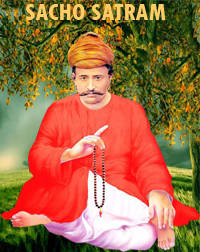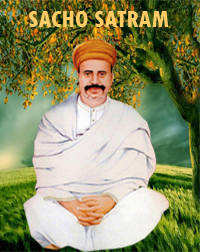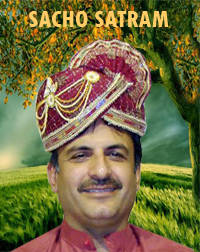
Guru Purnima has been celebrated since the time of Maharishi Vedvyasa, a renowned scholar and one of the most knowledgeable individuals in the world. The origin of this tradition can be traced back to a moment when Maharishi Vedvyasa was in a state of distress and Rishi Narad approached him, inquiring about the cause of his unhappiness.
Maharishi Vedvyasa explained that he was a scholar who had authored the Vedas and Puranas, and there was no one in the world quite like him. Despite his accomplishments, he confessed to feeling upset and unhappy. Rishi Narad then offered insight by suggesting that Maharishi Vedvyasa’s unhappiness stemmed from not regularly chanting the name of his lord. He advised Maharishi Vedvyasa that by consistently invoking the name of his almighty lord, he would find contentment and happiness, dispelling his sorrow.Upon heeding Rishi Narad’s counsel, Maharishi Vedvyasa requested him to provide a ‘Mantra’ for him to chant in order to achieve peace of mind. It was from this moment that the tradition of celebrating Guru Purnima commenced.
Throughout our lifetime, our pursuit is to attain happiness, prompting us to engage in various actions, both virtuous and otherwise. The central objective behind all our endeavors is the attainment of personal happiness. In our quest for ultimate happiness and a tranquil existence, we diligently strive to surmount the obstacles that arise in our lives, aspiring to create a path towards a smoother and more harmonious life.
Great saints emphasize the importance of having a ‘Guru’ in our lives if we truly desire lasting happiness and aspire to attain ultimate inner peace. A Guru is akin to a teacher who directs us along the correct path in life. It’s analogous to when we visit an unfamiliar city and rely on a skilled driver to take us to our intended destination. By doing so, we ensure that we arrive at the right place at the right time. Conversely, if we were to attempt to find our way without the precise knowledge of the area, we risk becoming lost or squandering valuable time. Thus, seeking guidance from those who possess knowledge is the prudent choice for reaching our desired goal.
In a similar vein, each of us requires a Guru in our life who can provide guidance and lead us along the path toward genuine peace and happiness. This ensures that our lives are not spent in vain, but rather, we can lead a meaningful and purposeful existence.
Rishi Narad explained to Maharishi Vedvyasa that when an ordinary person chants the name of God, he draws closer to the divine, and in doing so, he and his Satguru, become unified. This unity allows an ordinary person to ascend to the greatest heights of eternal power, much like a droplet of water merging with the vast ocean. Just as the droplet assumes the form of the ocean and becomes as vast and great as the ocean itself, a common individual who chants the name of their lord becomes extraordinary, attaining the profound divine powers of their deity.
The practice of chanting the name of one’s lord or Guru is exceedingly vital in the current age of ‘Kalyug.’ In this era, ‘Kal’ signifies conflict or strife, and ‘yug’ denotes a period. It’s an age marked by constant strife, where we frequently witness people engaged in senseless disputes, often driven by baseless jealousy. People, in general, have become increasingly self-centered and mean-spirited.
In this age, it’s common to find individuals who struggle to accept the progress and success of others, leading to conflicts, even within small families. People seem to engage in disputes without needing a specific reason, merely seeking opportunities to quarrel. This is why it is emphasized that chanting the name of the lord is a necessity in this ‘Kalyug’ period. Such a practice brings inner peace, helps us overcome our weaknesses, and bestows us with a genuine source of energy, akin to how an ordinary individual like Sant Kanwar Ram Sahib transformed into a great saint, a true disciple of Shahansha Satguru Sant Satramdas Sahib, solely through dedicated chanting of his name.
It’s important not to perceive the chanting of the lord’s name as an arduous or strenuous task. When we view something as a daunting or formidable endeavor, we may become discouraged and ultimately fail to act. However, if we regard the act of chanting the Lord’s name as routine as having a meal, going to the office, opening our shop, or sending our children to school, we can integrate it seamlessly into our daily lives. Nobody reminds us to send our children to school, open our shop, or eat our meals; we do these things of our own accord. Similarly, by establishing a daily practice of chanting the lord’s name at a set time, we can incorporate it into our routine effortlessly.
When we observe a fast during certain occasions, we often experience hunger throughout the day, tempting us to eat something. We exercise self-control and suppress this feeling, but the underlying discomfort arises from the fact that we haven’t eaten at our usual times. Similarly, if we establish the habit of chanting the Lord’s name, we will consistently remember to do so at the designated time every day, much like our regular meal times.
It’s crucial to understand that ‘Nam Simran’ or the chanting of the Lord’s name empowers us with positive energy, enabling us to overcome approximately 70% of our worries. The remaining challenges are often resolved through the grace of the almighty Lord, whose name we devoutly chant every day. Gurupurnima serves as a reminder of our duty to remember our omnipresent, omniscient Lord, our protector, and our almighty. This occasion prompts us to wisely utilize our precious time by incorporating the daily habit of chanting the name of God or our Satguru through ‘Naam Simran’ or meditation.



